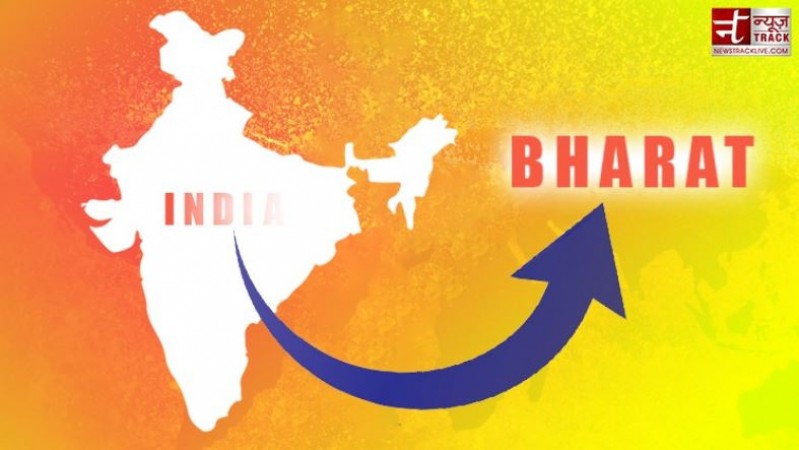
The question of removing the name "India" from the country's name has sparked a debate, delving into thousands of years of history. How did this land come to be known as India, and who first referred to this country as India? According to popular belief, did the British first give it the name India? These are some of the questions surrounding the name of our country. In the Constitution of India, our country is referred to as both "India" and "Bharat." The definition of the name is provided in Article 1 of the Constitution, which states, "India, that is Bharat."
The India vs. Bharat Debate:
The dispute between the names "India" and "Bharat" has been ongoing for a while. On this matter, Shubhendu Adhikari, a leader of the West Bengal BJP, claimed that the name "India" was given to us by the British and that we need to break free from it. But is this true? Let's explore who gave our country the name "India" and how this name became prevalent.
The Origin of the Word "India":
The use of the word "India" can be traced back to the Greeks. When Greek travelers arrived in the region along the banks of the Indus River around the 5th century BCE, they referred to the people living across the Indus River as "Indos" or "Indoi." Essentially, the Greeks wanted to refer to the people living across the Indus River as "Hindus." It was during this time that terms like "Hindu," "Hinduvan," and "Hindush" were used to describe the people living along the Indus River. From there, the name "Hindu" became associated with the people living along the Indus River, and the name of this land became "Hindustan."
India's Name in Ancient Times:
The use of "Hindus" dates back to the time of the Indus Valley Civilization. Some centuries later, when Greek and Persian people came into contact with those living across the Indus River, they started calling them "Indus" instead of "Sindhu." It was because of the Indus River that these people were initially called "Hindus," and various terms like "Hindu," "Hinduvan," and "Hindush" were used to describe them. It was from this "Sindhu" that the name "Hindu" originated, and the name of the land became "Hindustan."
The Transition to "India":
The use of the word "India" began with the Greeks, who first referred to the land across the Indus River as "Indos." The name "Indos" was later adopted in Latin as "India." This transition occurred due to the influence of the Indus Valley Civilization. The name "Sindhu" and its variants, including "Indus," were well-established by the time the Greeks arrived. They adopted the term "Indus" and, in Latin, it became "India." From that point onwards, Europeans began using the name "India" to refer to our country.
The Role of Megasthenes:
The word "Indika" was first used by the Greek traveler Megasthenes. Megasthenes was an envoy from Greece who visited the court of Chandragupta Maurya. Based on his experiences in India, he wrote a book called "Indika." Megasthenes lived in Pataliputra for an extended period, and it was during this time that he coined the term "Indika" to describe the land. This usage of the word "Indika" contributed to the adoption of the name "India" in Europe.
The Post-Independence Debate:
After gaining independence, the question of what name to use for the country arose during the drafting of the Indian Constitution. There was a debate in the Constituent Assembly regarding whether the country should be known as "India," "Hindustan," "Hind," or "Bharat." Dr. B.R. Ambedkar, the Chairman of the Drafting Committee of the Constitution, initially favored adopting the name "India" to expedite the process. However, other members were concerned about understanding the relationships between names like "India" and "Bharat." In the end, it was decided that both names, "India, that is Bharat," would be used in Article 1 of the Constitution to represent the country. This decision aimed to accommodate the diverse linguistic and cultural regions of the nation.
The Use of "India" in the Modern Era:
The widespread use of the name "India" began in the late 15th century when Portuguese explorer Vasco da Gama embarked on a sea voyage to discover a maritime route to India in 1498. This voyage led to European powers referring to India as "East India." Subsequently, British, French, Portuguese, and Dutch colonial powers established their East India Companies to trade with India. During this period, India was commonly referred to as "Hindustan" due to the influence of the Mughal Empire.
However, the European colonizers found it challenging to pronounce and use the term "Hindustan" in their languages. It was during this time that the British realized that the civilization along the Indus River was known as the "Indus Valley Civilization," and they began to use the term "India" to describe this region. This led to the gradual adoption of the name "India."
The name "India" has a historical trajectory that includes influences from Greek, Latin, and the experiences of early European travelers. While the British played a role in popularizing the name, it was originally derived from the term "Indus" and had been used in various forms by Greeks, Romans, and others. The debate over whether to use "India" or "Bharat" continued post-independence, with the adoption of both names in the Constitution to reflect the diversity of the nation. Ultimately, the name "India" has become widely accepted and recognized globally as the name of our country.
Centre Approves Rs 3,760 Cr Funding for Battery Energy Storage System
G20 Summit: Delhi Police Restrict Access to India Gate and Kartavya Path